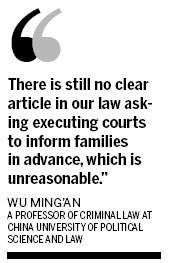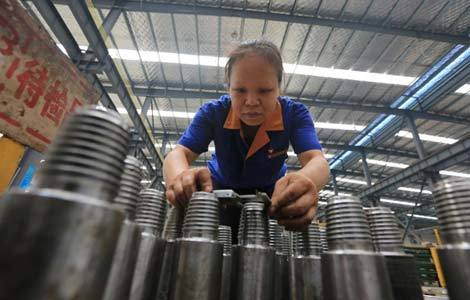Families and experts call for more clarity on execution law
Updated: 2013-07-16 07:14
By Cao Yin (China Daily)
|
||||||||

Legal experts have called for China to clarify rules that require courts to inform the relatives and lawyers of death-row prisoners ahead of an execution.
The call comes after Zeng Shan, in central Hunan province, said she was not told ahead of time about her father's execution.
Zeng complained on Sina Weibo, China's version of Twitter, on Friday about the Changsha Intermediate People's Court's handling of the case, setting off controversy.
She had been waiting for the results of a sentence review by the Supreme People's Court, but instead received news that her father was dead, Wang Shaoguang, the family's lawyer, said on Sunday.
"She couldn't accept it, and that is why she wrote about it on her micro blog," he said.
The intermediate court sentenced Zeng Chengjie to death in May 2011 for generating more than 3.4 billion yuan ($554 million) through illegal fundraising. Hunan Provincial High People's Court went on to dismiss an appeal and later said China's top court had upheld the verdict on June 14.
Wang said he did not know about the sentence being carried out until Zeng Shan contacted him with the news.
In response to the complaint, Zeng Dingxin, a spokesman for the high court, said on Sunday that the intermediate court had displayed a notice about the impending execution outside its building on Friday.
He said the court was unable to get in touch with Zeng Shan because it did not have her contact details. Instead, the intermediate court sent a letter to Zeng Chengjie's son-in-law and asked him to collect the ashes within a week.
The intermediate court posted its own statement on Sina Weibo, claiming that Zeng Chengjie did not ask to see his family after being told he had that right before his execution. The court said its actions were in accord with the current judicial interpretation of Chinese Criminal Procedure Law, as provided by China's top court.
Wu Ming'an, a professor of criminal law at China University of Political Science and Law, said the current interpretation of the law does not oblige courts to inform families that an execution is about to take place. According to the interpretation, executing courts should permit and arrange a meeting if relatives apply for one, "but sometimes relatives don't even know when an execution will take place, let alone the application procedure," he said.
"In other words, there is still no clear article in our law asking executing courts to inform families in advance, which is unreasonable," he said, adding he hopes lawmakers can give a clearer interpretation soon.
Liu Renwen, a scholar of criminal law at the Chinese Academy of Social Sciences, said such conflicts arise because the entire process of appealing and reviewing death sentences "is not transparent enough".
Tang Hongxin, a criminal attorney, agreed that procedures need urgent regulation. "In the many cases I have handled, it is rare to see courts invite families and attorneys to meet condemned criminals before the execution. Instead, courts just asked convicts' relatives to collect the ashes," Tang said.
However, Fan Chongyi, also at China University of Political Science and Law, said there have been occasions when the families of death-row inmates have disrupted the execution after they were informed in advance, "which is the main concern and why the current interpretation hasn't been revised".
He suggested that families of convicts awaiting execution should apply for a meeting with the accused immediately after hearing the verdict or when asking for a death sentence review. "After all, it's not practical to put all your hopes on the top court throwing out the sentence," he added.
caoyin@chinadaily.com.cn
(China Daily USA 07/16/2013 page5)

 Obama urges restraint amid protests
Obama urges restraint amid protests
 Putin wants Snowden to go, but asylum not ruled out
Putin wants Snowden to go, but asylum not ruled out
 Apple to probe death of Chinese using charging iPhone
Apple to probe death of Chinese using charging iPhone
 Investment falters as industrial activity flags
Investment falters as industrial activity flags
 Rape victim's mother wins appeal
Rape victim's mother wins appeal
 Reproduction of 'Sunflowers' displayed in HK
Reproduction of 'Sunflowers' displayed in HK
 Land Rover enthusiasts tour the world
Land Rover enthusiasts tour the world
 US star sprinter fails drug test
US star sprinter fails drug test
Most Viewed
Editor's Picks

|

|

|

|

|

|
Today's Top News
China calls for new talks on Iran nuclear issue
Global warming may largely raises sea level
Putin wants Snowden to go, asylum not ruled out
Top foreign study destinations for Chinese
Trailblazer reaches out to inmates on death row
Air crash payouts could differ
Cabinet promises more funds for smaller firms
Capital prison tests therapy on inmates
US Weekly

|

|






